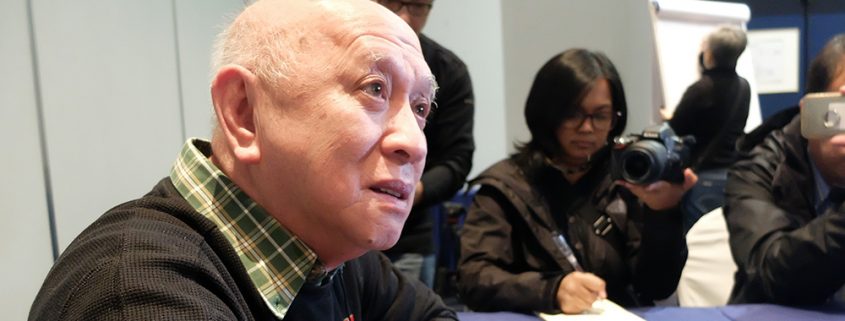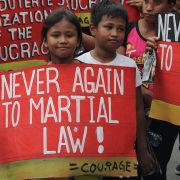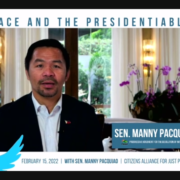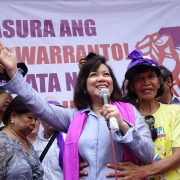Makilala encounter gives more ground for Reds to suspend unilateral ceasefire, says NDFP
ROME, Italy—The Armed Forces of the Philippines’ (AFP) offensive operation against a unit of the New People’s Army in Makilala, North Cotabato yesterday may give the Communist Party of the Philippines ground to suspend its unilateral ceasefire declaration, the National Democratic Front of the Philippines (NDFP) Negotiating Panel chairperson said.
In a press briefing, Fidel Agcaoili said that it appears there is deliberate and systematic sabotage of the ongoing formal peace talks in this city.
“What is happening is similar to what happened in 2005 to 2006 where many activists were killed, presided by the very same people like National Security Adviser Hermogenes Esperon and AFP Chief of Staff Eduardo Año,” Agcaoili said.
Aside from the hour-long clash that killed 33-year of New People’s Army fighter Rojet Ranara, Agcaoili also cited the killing of National Federation of Sugar Workers leader Alexander Ceballos and Katribu Party Surigao del Norte provincial coordinator Veronico Delamente last January 20.
“These attacks are putting the NPA in a tough position. The AFP are occupying communities, enforcing food blockades and preventing the farmers from going to their farmlands,” Agcaoili said.
The NDFP Panel chief said the Makilala clash was a clear AFP raid of an NPA encampment as evidenced by the photographs of backpacks and rifles posted online by the 39th Infantry Battalion of the Philippine Army.
“This is a speculation on my part, but there appears to be sabotage of the peace process. If such is the case, the continuation of the ceasefire is becoming untenable,” Agcaoili said.
But Agcaoili clarified it is not the NDFP which would suspend their ceasefire declaration.
“The six-month standing ceasefire was declared by the CPP and the NPA upon our recommendation. It would be up to them to suspend it based on their appreciation of the realities on the ground,” he clarified.
“The NDFP is preparing a letter of protest and we will issue a statement on the matter after,” Agcaoili said.
Bilateral ceasefire
GRP Negotiating Panel member Rene Sarmiento said the Makilala incident is not only the first test case of the newly-signed supplemental guidelines to the Joint Monitoring Committee but is another reason to forge a GRP-NDFP bilateral ceasefire agreement.
“There is more reason to sign a bilateral ceasefire agreement to be guided on what constitutes a violation. For instance, which areas are covered by the ceasefire and which are not,” Sarmiento said.
The Left’s chief peace negotiator said the NDFP is still open to discuss bilateral ceasefire proposals.
“We are set to receive the GRP’s proposal for a bilateral ceasefire (tomorrow) and we can even propose a future date for its discussion,” Agcaoili said.
He clarified however that the signing of a bilateral ceasefire agreement in this round is unlikely.
“It would not be during this round, unless Pres. Duterte declares he will release all political prisoners tomorrow,” Agcaoili said.
He added that the bilateral ceasefire agreement is dependent on the GRP’s compliance of the requisites.
“If the GRP really wants a bilateral ceasefire agreement, it should release all the political prisoners and stop their violations of their own ceasefire declaration,” Agcaoili added.
He recalled that it was Duterte who personally promised him the release of the political prisoners in May 14 and May 26 in Davao City.
But Agcaoili said Duterte admitted in their meeting in Malacañang last January 2 that the release of political prisoners is “unacceptable to the GRP military.”
“Magagalit ang militar (The military will be angry),” Duterte reportedly told Agcaoili.
“If such is the case, we can just talk while fighting,” Agcaoili said.
Agcaoili recalled that the NDFP succeeded in signing 14 major agreements with the Fidel Ramos GRP even without a ceasefire agreement.
Talks successful
Agcaoili said that the ongoing peace talksis turning out to be a success.
“We have so far signed the supplemental agreement on the Joint Monitoring Committee and there are advances in the discussions on socio-economic and political and constitutional reforms,” he said.
The third round of formal peace talks in this city is scheduled to close on Wednesday with the possible signing of the ground rules on the discussion of socio-economic reforms and a joint statement. # (Raymund B. Villanueva)







